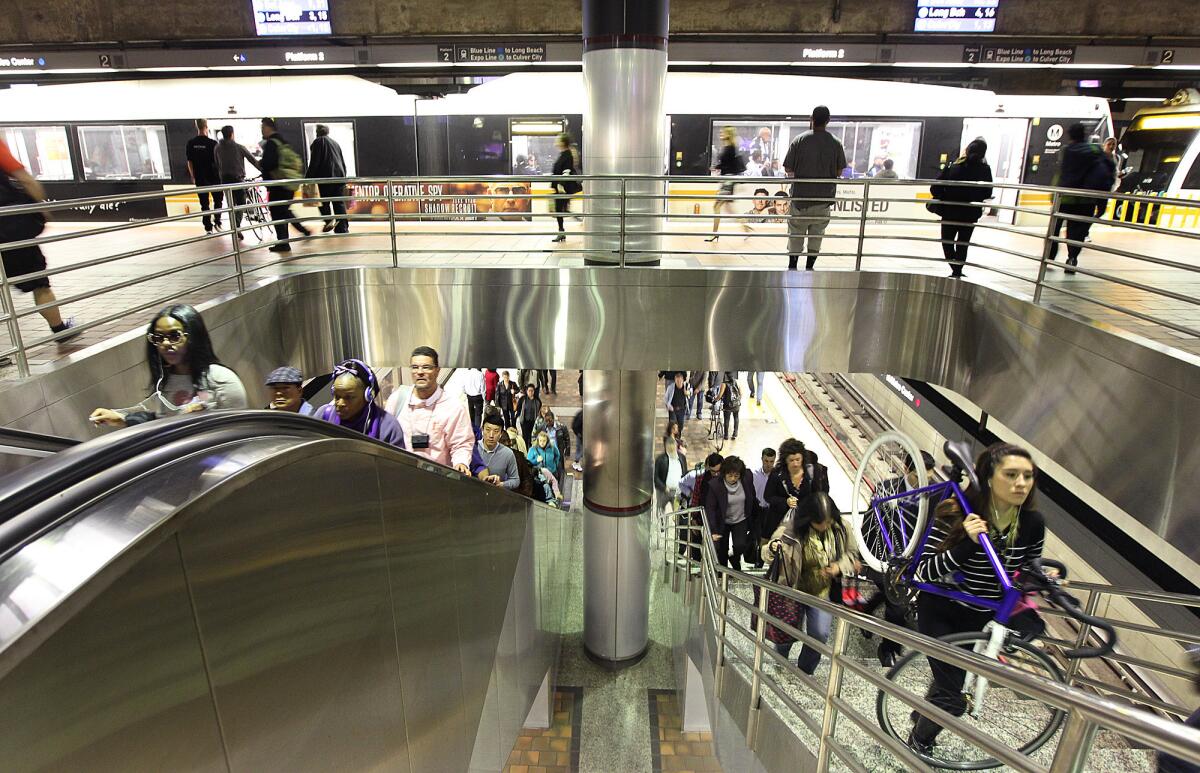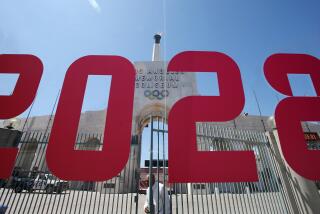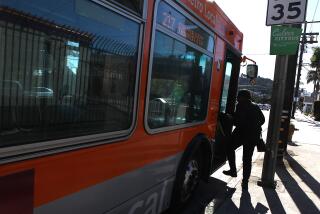Officials will decide today whether to raise Metro bus and rail fares

Capping months of debate over the effect of higher costs on low-income riders, Los Angeles County transportation officials will decide Thursday whether to raise Metro bus and rail fares in September and two more times over the next eight years.
Los Angeles County Metropolitan Transportation Authority staff say that unless fares go up, they will have to make service cuts to close an expected $36-million deficit in Metro’s 2016 budget.
That “unsustainable structural deficit” could grow to $225 million within the decade and must be addressed immediately, Metro staff members wrote in a recent report.
The fare vote comes as Metro accelerates the biggest rail boom in Los Angeles history: By the end of this year, five rail lines will be under construction, spanning Downtown Los Angeles and Mid-City to Azusa, South L.A. and Santa Monica. Once operational, those lines will add significantly to Metro’s operating budget.
The proposal that Metro staff support would increase one-way bus and rail fares from $1.50 to $1.75 in September, to $2 in 2017 and to $2.25 in 2021. Monthly passes would increase 33%, from $75 to $100. Day passes would increase from $5 to $7.
The alternate proposal would increase Metro fares during peak hours: first to $2.25 in September, and eventually to $3.25 in 2021. Off-peak fares would initially stay at $1.50. Monthly passes would increase to $125, a 66% increase. The day pass would increase to $9.
Both proposals would also change the agency’s transfer policy to allow two hours of unlimited trips. Currently, passengers must pay each time they board a new train or bus. Metro says for the 25% of passengers who pay for one-way fares, rather than a day or multiday pass, that will ease the pain of higher fares.
Critics of the fare increase argue higher costs would hurt minorities and low-income Angelenos the most. More than 80% of bus and rail riders are minorities, and the average household income for a transit rider is less than $20,000, according to agency data.
“I think it’s profoundly wrong,” said Eric Mann, co-chair of the Bus Riders Union. “The people we represent are literally running out of food by the 22nd, 23rd, 24th of every month.”
More costly monthly passes would add $300 to a minimum-wage worker’s annual budget, he said.
Of the 332 public comments Metro received on the fare increase, the agency said, nearly 70% were against and 17% were neutral.
A motion by Los Angeles County Supervisors Mark Ridley-Thomas and Zev Yaroslavsky, as well as Los Angeles Mayor Eric Garcetti, would allow fares to rise in September. The two subsequent fare hikes, as well as student fares, would be put on hold while a panel of transportation experts analyzed Metro’s long-term finances.
The panel would report back next summer on other revenue options that Metro could consider, including charging for parking at stations and linking the price of bus and rail fares to the Consumer Price Index. It would also examine possibly reducing long-term fare increases for weekly and monthly passes.
Mann said that rather than passing a stopgap motion, Garcetti, Ridley-Thomas and Yaroslavsky should “vote down the fare increase right in front of the bus riders’ faces.”
Also at issue is the portion of Metro’s operating budget funded through fares. Los Angeles is one of the most subsidized transit networks in the world: This year, fares paid for about 26% of the agency’s operating budget, meaning 74% of costs were funded through taxes and grants.
Any farebox ratio less than 33% could jeopardize Metro’s chances at receiving future federal grants.
Metro has raised fares three times in the last 19 years. Although its base fare is $1.50, the average fare per passenger is closer to 70 cents, mainly because seniors, students and the disabled receive discounted fares.
More to Read
Start your day right
Sign up for Essential California for news, features and recommendations from the L.A. Times and beyond in your inbox six days a week.
You may occasionally receive promotional content from the Los Angeles Times.







